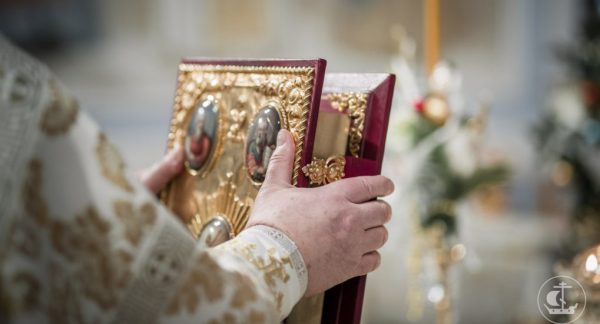On the Sunday after the Ascension we remember the Holy Fathers of the First Ecumenical Council. In honoring them, we remember an extremely special time in Church history which followed on the heels of three centuries of persecution. In 313 the Emperor Constantine the Great published the Edict of Milan, which gave the Christian Church the legal right to exist and essentially brought the Church out of the catacombs and into the open. A new epoch began in the life of the Church: everywhere churches were being built and thousands of people received baptism and started coming to church. Thus, what was done earlier in secret was now all of a sudden brought out into the light and put “on a stand, and it gives light to all in the house” (Mt. 5:15). The universe was illumined by the light of the Christian faith. Whatever prevented the preaching of the Christian faith in the past no longer existed, and the mission of the Church and her work now took on a new and different level.
However, the enemy of the human race [the devil], who does not want to see people be saved and was now hampered from fighting against the Church on the outside, now decided to try to tear the church apart from the inside. He inspired a few people, among them the heretic Arius**, with the idea to pervert Christian teaching by saying that supposedly the Son of God, our Lord Jesus Christ, was not equal or co-eternal with God the Father, but that He was created by God and came into existence in time just like each of us.
Not even twenty years had passed since the publication of the Edict of Milan when it became necessary to summon an Ecumenical Council* in order to repel this attack on the Church — this threat which came not from without but from within. The Fathers of the First Ecumenical Council courageously and steadfastly opposed the Arian heresy which, like a cancerous tumor, was eating away the Body of the Church. However, it was not immediately after the conciliar resolution that this heresy was eradicated: in 381 it became necessary to summon a Second Ecumenical Council in order to again condemn this heretical teaching which had become deeply rooted. When the Fathers formulated the teaching on the Trinity: that the Father, Son and Holy Spirit are equally honored and worshipped and are Three Persons which comprise one Holy Trinity — not three gods, but one God worshipped in Three Persons, — then the Arian heresy was finally defeated.
The struggle with this heretical teaching was a struggle for the Church, for her survival and so that the Church would remain faithful to the Holy Truth which was taught by our Lord Jesus Christ Himself.
Sixteen centuries have passed since that time, and for us today it can seem like a long time ago in the distant past. Perhaps only a few people today know about the First Ecumenical Council, who Arius was, and why it was so important to defeat his heresy. However, in our lifetime and in the history of mankind, events can in one way or another repeat themselves. Today we may not face the heresy of Arius, but there are many other false teachings which are spreading among the people and are causing the faithful to go astray from the path to salvation.
The Church faces many challenges in the modern world — both externally and internally. How important it is, in spite of the spirit of the times and in the face of all the new false teachings, to unwaveringly guard the truth and to firmly keep the Holy Orthodox Faith!
Do not be disheartened that here in this country we are a small flock (Lk. 12:32), a religious minority. You are the keepers of the true faith; it was given to you by the Lord, not according to your merit, but so that before the world you would testify about it, to those who are close to you and to those who are far from you, so that you will bear witness to the true faith not only by your words, but above all, by how you live your lives.
The Lord has entrusted this mission to each and every one of us. And all of us — no matter where we are or where we live — must remember that our Lord Jesus Christ expects us to actively bear witness of Him to the world about His Resurrection and about His commandments. We are guilty before the Lord if we spend our lives in idleness and we bury in the ground the talents and treasures God has given us, instead of using them and multiplying them.
Each of us, no matter what country we live in, must be an apostle of the Lord and preach to the people surrounding us the truth of Christ’s Resurrection.
Translated from the Russian by Archpriest Peter Olsen
_____________________________________________________________________________________
* ~ The First Ecumenical Council was held in the city of Nicea in AD 325.
** ~ Arius was a well-known Alexandrian presbyter, scholar and theologian. Full of pride and arrogance, he was upset when Alexander was elected as the new archbishop of Alexandria instead of him. He began to attack the theology of St. Alexander. As with all heretics, pride was the root of his heresy.

















